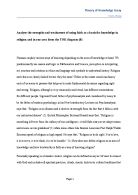Discuss the strength and weaknesses of using logic as the justification for your knowledge claims
Discuss the strength and weaknesses of using logic as the justification for your knowledge claims.
What does it really mean when one says “be logical” or “keep your head on straight”? What makes an argument justifiable? And what are the requirements that justify a knowledge claim? Using logic in order to justify a knowledge claim is definitely an essential aspect but not the only one. Arguments may be perfectly logical and valid but not necessarily true, meaning that not all logical arguments are good reasons and justify what we claim to know. In my opinion, logic is not the only thing that is able to justify a knowledge claim. Although it is a crucial aspect, other ways of knowing are also required when it comes to the justification of knowledge claims. There are many weaknesses to using logic as the justification for knowledge claims because something being logical may not be true and therefore not justify anything claims. However, there are also strengths to using logic as a justification as such that if something is not logical it is very unlikely it will be true.
Logic is probably one of the strongest ways of knowing because something must be logical in order for humans to believe it. Many animals use inductive logic along with sensory perception and memory to figure things out. However, as human beings grow older, they increase their use of deductive logic. Deductive logic is more specific and has certain rules in order to check the validity of statements where as inductive logic arrives at a general conclusion through generalizations or assumptions. Deductive logic goes from a general statement to a particular and personal statement and then a specific conclusion is reached. However, it is very hard for us humans to know with complete certainty that something we claim to know is absolutely true. As Einstein once said “Nothing can prove you right no matter how many experiments you use, but it only takes one experiment to prove you wrong”. Therefore, humans use logic to evaluate reasons and justify knowledge claims. That is when validity comes into place and something that is then valid can have a chance at being true. An argument that is not valid will never be true because the conclusion does not follow, and therefore it is not logical. That is why using logic as the justification for your knowledge claims allows one to judge if the knowledge claim is valid and decide whether or not it is a good reason. When I was in kindergarten I once thought that the moon was Paris. I always wanted to go to Paris, and when I saw it on a map I came to the conclusion that it looked like the moon’s craters. Obviously I was not thinking logically and my conclusion of the moon being Paris was totally untrue. Therefore, without logic one would not be able to judge if something was true, so possibly things that are nonsense would be regarded as true.








